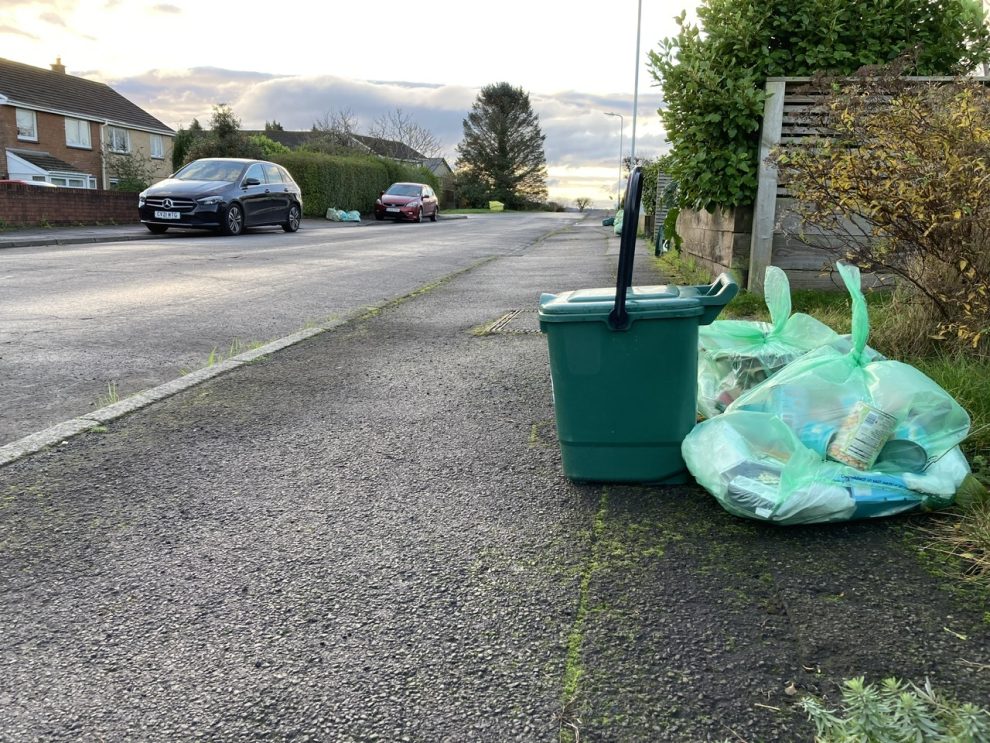CONTAINERS for cans and bottles and reusable sacks for paper and cardboard could be rolled out to Swansea households in a change to the recycling collection service.
No final decisions have been made, but council chiefs want to eliminate the approximately 10 million single-use plastic bags it said were used each year when residents put them out every fortnight with their recycling in.
New lockable containers and Hessian-style sacks have been trialled mainly in Port Tennant and, if deemed successful, the intention would be to dish them out across the county.
The only change for householders would be putting cans and bottles in containers and paper and cardboard in a sack, instead of green plastic bags. Food waste, plastic waste and black bag waste collection would remain the same as now.
Chris Howell, the council’s head of waste, parks and cleansing, told councillors on a scrutiny panel that feedback from residents in the trial area would be assessed.
Asked by Cllr Peter Black if households with little storage space might struggle with a switch from the current plastic bags, Mr Howell said a smaller container for cans and bottles for those properties might be considered.
Cllr Cyril Anderson, cabinet member for community services, said initial feedback on Facebook about the trial had been “very good” although there had been some teething issues.
St Thomas councillor Joe Hale, who is not a member of the scrutiny panel, told the Local Democracy Reporting Service that the street where he lived was part of the trial. “The feedback has been fantastic,” he said. “I have not had a phone call or email from people saying they didn’t like it. Residents tell me they’re disappointed it (the trial) has finished.”
At the meeting Cllr Matthew Jones said he had a “huge hatred” of the single-use aspect of the plastic bags currently used and asked if the council would save money by switching to containers and sacks.
Mr Howell said he anticipated that a switch would be “cost neutral”, should it go ahead, with a saving on the plastic bags but a cost for the purchase and occasional replacement of containers and sacks. He added that the system being trialled would slow down the kerbside collection process, meaning more crews would be required.
Cllr Jones also asked if alternatives to the plastic food waste bags that residents put in their food caddies had been considered. “They drive me nuts,” he said. Mr Howell replied: “At the moment, no.” He said people put less waste food out for composting if they had to put it straight into their food caddy, and that the company which dealt with Swansea’s food waste stripped out the bags before the food was broken down in an anaerobic digester. Cllr Jones asked how the council could be sure the bags were stripped out, and it was agreed that confirmation would be sought.
Mr Howell also told the panel that the council had one electric refuse lorry, which was mainly used for commercial waste. “We are not yet convinced that they’re robust enough to be used across the entire fleet,” he said. “Also they cost about twice as much as a normal (diesel) vehicle.”
Cllr Anderson said refuse lorries in the future might be powered by hydrogen derived from renewable energy – known as “green” hydrogen.
Councillors went on to ask about about a requirement coming into force next April for businesses and public sector organisations in Wales to separate their waste for recycling, as households do. Councils and private sector firms collect commercial waste on a paid-for basis.
Mr Howell said the authority would be advising its commercial waste customers about the new regulations and that it was hard to know how they would react and what the impact would be. “We would still need to cover our costs,” he said. Cllr Black described the new commercial sector regulations as “long overdue”.
Cllr Chris Evans then asked about another waste-related scheme that would make companies of packaged goods responsible for the cost of the recycling and management of that packaging. It’s called the “extended producer responsibility” scheme – basically placing the onus upstream on the producer – and has Welsh Government, UK Government and Scottish Government support. But the proposed implementation date of next October has been deferred to October 2025.
Mr Howell said it wasn’t clear at this stage what the extended producer responsibility scheme would or wouldn’t include, and reckoned that consumers would foot the bill if producers had to invest more money into packaging to make it easier to recycle. “It is a very complex issue,” he said.
A report before the service improvement, regeneration and finance panel said 71.8% of Swansea’s municipal waste was recycled and composted in 2022-23 – the highest rate of Wales’s 22 council areas. This was 6.7% more than the previous year, but mainly because black bag rubbish is incinerated now rather than sent to landfill with the ash from the incineration process classed as a recyclable product.
Swansea’s waste collection service costs just under £23 million per year, but it claws back just over £8 million by selling recyclable products, through its commercial contracts, and via Welsh Government grants.




















